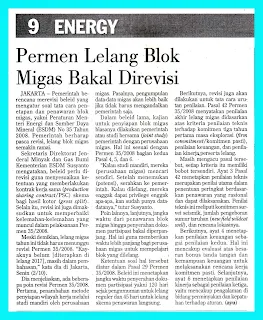The government plans to revise the regulation that regulates the procedure of stipulating and offering of oil and gas blocks, namely the Minister of Energy and Mineral Resources (ESDM) Number 35 Year 2008. The Government hopes that after the revision, the auction of oil and gas blocks is getting crowded.
Secretary of the Directorate General of Oil and Gas of the Ministry of Energy and Mineral Resources Susyanto said the regulation needs to be revised in order to conform the provisions imposing a production sharing contract (PSC) of gross split scheme.
In addition, this revision is also intended to improve the weaknesses that arise in the implementation of Ministerial Regulation 35 / 2008. However, this year's oil and gas auction does not have to wait for the revision of Ministerial Regulation 35/2008.
"It seems to have not been implemented in the 2017 auction, still in the discussion," he said in Jakarta, Monday (2/10).
He explains, there are some points revision of Ministerial Regulation 35/2008. First, the addition of methods of preparing working areas through self-study by oil and gas companies. Because the data collection of oil and gas will be better if not have to rely on government alone.
In the old regulation, the review for oil and gas block preparation is usually done by government or joint study of government with oil and gas company. This is in accordance with Ministerial Regulation 35/2008 of the second part of Articles 4, 5, and 6.
"If the study is self-sufficient, they (the oil and gas companies) are looking for themselves. After finding the potential, submit it to the government. If auctioned, they can not privilege is okay, because already have the data, "said Susyanto.
Another point, the period from which the offer of oil and gas blocks until the submission of documents of participation will be extended. This is to provide longer time for oil and gas companies to study the block auctioned. The provisions of the matter are regulated in Article 29 of Ministerial Regulation 35/2008. This beleid stipulates the period of submission of documents of participation ie 120 days from the announcement for regular auction and 45 days for auction of direct offer scheme
Next, revisions will also be made to the ordering procedure of the assessment. Article 42 Ministerial Regulation 35/2008 states that the final assessment of oil and gas auction is based on the technical assessment criteria of the commitment of the first three years of exploration (firm commit / firm commitment), financial valuation, and performance evaluation of the auctioneer.
Still referring to the article, each criterion has its own weight. Paragraph 3 of Article 42 establishes a technical assessment as the primary appraiser in ranking based on rational and workable offerings. These technical assessors include seismic survey commitments, number of new field wildcat wells, and location plans.
Next, paragraph 4 sets out a financial assessment as a second appraisal. This includes an evaluation of the magnitude of signature bonuses and financial capacity to implement a definite commitment work plan. Furthermore, paragraph 6 sets the scores performance as a third assessment, which includes experience in the field of petroleum and compliance with the rules.
IN INDONESIA
Peraturan Menteri tentang Lelang Blok Minyak dan Gas Akan Direvisi
Pemerintah berencana merevisi regulasi yang mengatur soal tata cara penetapan dan penawaran blok minyak dan gas, yakni Peraturan Menteri Energi dan Sumber Daya Mineral (ESDM) Nomor 35 Tahun 2008. Pemerintah berharap pasca revisi, lelang blok minyak dan gas semakin ramai.
Sekretaris Direktorat Jenderal Minyak dan Gas Bumi Kementerian ESDM Susyanto mengatakan, regulasi perlu direvisi guna menyesuaikan ketentuan yang memberlakukan kontrak kerja sama (production sharing contract/ PSC) skema bagi hasil kotor (gross split).
Selain itu, revisi ini juga dimaksudkan untuk memperbaiki kelemahan-kelemahan yang muncul dalam pelaksanaan Peraturan Menteri 35/ 2008. Meski demikian, lelang migas tahun ini tidak harus menunggu revisi Peraturan Menteri 35/2008.
“Sepertinya belum diterapkan pada lelang 2017, masih dalam pembahasan,” kata dia di Jakarta, Senin (2/10).
Dia menjelaskan, ada beberapa poin revisi Peraturan Menteri 35/2008. Pertama, penambahan metode penyiapan wilayah kerja melalui studi mandiri oleh perusahaan migas. Pasalnya, pengumpulan data-data migas akan lebih baik jika tidak harus mengandalkan pemerintah saja.
Dalam regulasi lama, review untuk penyiapan blok migas biasanya dilakukan pemerintah atau Studi bersama (joint study) pemerintah dengan perusahaan minyak dan gas. Hal ini sesuai dengan Peraturan Menteri 35/ 2008 bagian kedua Pasal 4, 5, dan 6.
“Kalau studi mandiri, mereka (perusahaan minyak dan gas) mencari sendiri. Setelah menemukan potensi, serahkan ke pemerintah. Kalau dilelang, mereka tidak dapat privilege tidak apa-apa, karena sudah punya data-datanya,” tutur Susyanto.
Poin lainnya, jangka waktu dari penawaran blok minyak dan gas hingga penyerahan dokumen partisipasi akan diperpanjang. Hal ini untuk memberikan waktu lebih panjang bagi perusahaan migas untuk mempelajari blok yang dilelang. Ketentuan soal hal tersebut diatur dalam Pasal 29 Peraturan Menteri 35/2008. Regulasi ini menetapkan jangka waktu penyerahan dokumen partisipasi yakni 120 hari sejak pengumuman untuk lelang reguler dan 45 hari untuk lelang skema penawaran langsung
Berikutnya, revisi juga akan dilakukan untuk tata cara urutan penilaian. Pasal 42 Peraturan Menteri 35/2008 menyatakan penilaian akhir lelang migas didasarkan atas kriteria penilaian teknis terhadap komitmen tiga tahun pertama masa eksplorasi (firm commitment/komitmen pasti), penilaian keuangan, dan penilaian kinerja perserta lelang.
Masih mengacu pasal tersebut, setiap kriteria itu memiliki bobot tersendiri. Ayat 3 Pasal 42 menetapkan penilaian teknis merupakan penilai utama dalam penentuan peringkat berdasarkan penawaran yang rasional dan dapat dilaksanakan. Penilai teknis ini meliputi komitmen survei seismik, jumlah pengeboran sumur taruhan (new field wildcat well), dan rencana lokasinya.
Berikutnya, ayat 4 menetapkan penilaian keuangan sebagai penilaian kedua. Hal ini mencakup evaluasi atas besaran bonus tanda tangan dan kemampuan keuangan untuk melaksanakan rencana kerja komitmen pasti. Selanjutnya, ayat 6 menetapkan penilaian kinerja sebagai penilaian ketiga, yaitu mencakup pengalaman di bidang perminyakan dan kepatuhan terhadap aturan.
Investor Daily,Page-9, Wednesday, October 4, 2017








